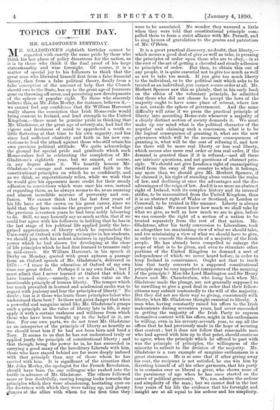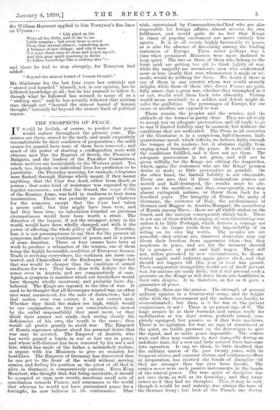TOPICS OF THE DAY.
MR. GLADSTONE'S BIRTHDAY.
MR. GLADSTONE'S eightieth birthday cannot be regarded with exactly the same pride by those who think his last phase of policy disastrous for the nation, as it is by those who think it the final proof of his large statesmanship and wise foresight. Of course, it is a Matter of special joy to his followers to think that the great man who liberated himself first from a false financial theory, then from a false political theory, finally from a false conception of the amount of help that the Church should owe to the State, has up to the great age of fourscore gone on throwing off error, and perceiving new developments of the sphere of popular right. To those who sincerely believe this, as Mr. John Morley, for instance, believes it,— we cannot feel any confidence that Sir William Harcourt really shares the conviction that Irish Home-rule would bring content to Ireland, and lend strength to the United Kingdom,—there must be genuine pride in thinking that Mr. Gladstone, at the great age of seventy-six, had had the vigour and freshness of mind to apprehend a truth so little flattering at that time to his own sagacity, and has since had sufficient elasticity and faith in his new con- victions to lead the attack against those who still retain his own previous political attitude. We quite acknowledge the ground for special pride and gratitude which such Home-rulers feel in celebrating the completion of Mr. Gladstone's eightieth year, but we cannot, of course, in any degree share it. We heartily honour Mr. Gladstone's courage and earnestness and faith in the constitutional principles on which he so confidently, and as we think, so superstitiously relies, while we wish that he would give his opponents more credit for their steady adhesion to convictions which were once his own, instead of regarding them, as he always seems to do, as an amazing and almost incredible mixture of perversity and con- fusion. We cannot think that the last four years of his life have set the crown on his great career, since we hold that they have undone the greater part of what for the previous seventeen years he had been nobly labouring to do. Still, we may honestly say as much as this, that if we could but agree with his followers in holding that he has in the last stage of his political life applied justly the late- gained appreciation of liberty which he reproached the University of Oxford with failing to inspire in her students, we should join with his ardent admirers in applauding the power which he had shown for developing at the close of life principles which he had first learned to treasure only in mid-career. Sir William Harcourt, in his speech at Derby on Monday, quoted with great aptness a passage from an Oxford speech of Mr. Gladstone's, delivered in 1878 :—" I trace in the education of Oxford of my own time one great defect. Perhaps it is my own fault ; but I must admit that I never learned at Oxford that which I have learned since,—namely, to set a due value on the inestimable principle of human liberty. The temper which too much prevailed in learned and academical ranks was to regard with jealousy and fear the principles of liberty." No doubt ; but is it those who learn those principles latest who understand them best ? Is there not great danger that when a powerful and sanguine mind like Mr. Gladstone's grasps such a principle as the value of liberty late in life, it may apply it with a certain rashness and wildness from which those who have been brought up in the belief in it, are free. For our own parts, we do not trust Mr. Gladstone as an interpreter of the principle of liberty as heartily as we should trust him if he had not been born and bred a Tory. It seems to us that he has not understood truly or applied justly the principle of constitutional liberty; that though, being the power he is, he has succeeed in carrying a good many of the hereditary Liberals with him, those who have stayed behind are far more deeply imbued with that principle than any of those whom he has carried with him. It is significant of the situation that Mr. John Morley, the apologist for the French Revolution, should have been the one colleague who rushed into the battle in advance of Mr. Gladstone. The others followed more or less doubtfully, casting longing looks towards the principles which they were abandoning, hesitating eyes on the doctrines with which they were taking up, and gloomy glances at the allies with whom for the first time they were to be associated. No wonder they wavered a little when they were told that constitutional principle com- pelled them to form a strict alliance with Mr. Parnell, and- to sing hymns of gratulation to the genius and patriotism of Mr. O'Brien.
It is a great practical discovery, no doubt, that liberty,— which means a good deal of give as well as take, in pressing- the principles of order upon those who are to obey,—is at the root of the art of getting a cheerful and steady adhesion to principles of order. But then, to obtain this out of any people, it is quite essential not to give too much as well as not to take too much. If you give too much liberty to the individual, or to the political unit which asks to be- treated as an individual, you cannot secure order at all. Mr_ Herbert Spencer saw this so plainly, that in his early book on the ethics of the voluntary principle, he admitted that those who did not choose to accept the laws of the majority ought to have some place of retreat, where law is not, outside the sphere of government. And the same difficulty will arise if we press the practical principle of liberty into according Home-rule whenever a majority of a clearly distinct section of society demands it. We must make up our mind what is the political character of the popular unit claiming such a concession, what is to be the logical consequence of granting it, what are the new grievances which will be the necessary consequences of granting it, what will be the cost of refusing it, and how far there will be more real liberty or less real liberty, which means also more real order or less real order, if the demand is granted than if it is refused,—and all these are intricate questions, and not questions of abstract prin- ciple. We should not give London a right of emancipating itself from the sway of the country to which it belongs, any more than we should give Mr. Herbert Spencer, if he claimed it, his right of standing alone outside the realm of law, and declining at once the advantages and the dis- advantages of the reign of law. And it is no more an abstract right of Ireland, with its complex history and its internal strifes, to be manumitted from the United Kingdom, than it is an abstract right of Wales or Scotland, or London or Cornwall, to be treated in like manner. Liberty is always give and take. We must know how much we shall take by what we give, as well as how much we are to give, before we can concede the right of a section of a nation to be treated separately from the rest of that nation. Mr. Gladstone, after his tardy conversion to Liberalism, took an altogether too maximising view of what we should take,. and too minimising a view of what we should have to give, in order to concede the demands of a majority of the Irish people. He has already been compelled to enlarge the scope of what is to be given, and even to stimulate other portions of the United Kingdom to demand a sort of independence of which we never heard before, in order to keep Ireland in countenance. Ought not that to teach him that tardy converts to a supposed constitutional principle may be very imperfect interpreters of the meaning of the principle ? Men like Lord Hartington and Sir Henry James - and Mr. Chamberlain, who hung back when Mr. Gladstone made the plunge, are not generally supposed to be unwilling to give a good deal in order that their fellow- citizens may submit contentedly to the will of the majority_ But they did not see their way to giving, consistently with liberty, what Mr. Gladstone thought essential to liberty. A man who, having constantly raised his offers to the Irish malcontents during seventeen years, had never succeeded in getting the majority of the Irish Party to express themselves content with his offers, might in his enthusiasm be willing, even in his seventy-seventh year, to cap all the offers that he had previously made in the hope of securing that content ; but it does not follow that reasonable men who had agreed with him up to that point, should continue to agree, when the principle which he offered to part with was the principle of principles, the willingness of the minority to submit to the decision of the majority. Mr. Gladstone is a rare example of sanguine enthusiasm in a, great statesman. He is so sure that if after giving away his coat, the recipient is not satisfied, he can win him by divesting himself of all his other garments, that his party is in ecstasies over so liberal a giver, who shows none of the parsimony of age when he has once started on the career of political generosity. We, too, admire the ardour and simplicity of the man ; but we cannot find in the last four years of his life the evidence that his foresight and insight are at all equal to his ardour and his simplicity. Sir William Harcourt applied to him Tennyson's fine lines on Ulysses :—
" Life piled on life Were all too little, and of one to me Little remains • but every hour is saved From that eternal silence ; something more A bringer of new things ; and vile it were For some three suns to store and hoard myself, And this gray spirit yearning in desire
To follow knowledge like a sinking star"— and there he had to stop abruptly, for Tennyson had added :
" Beyond the utmost bound of human thought."
Mr. Gladstone for the last four years has certainly not " stored and hoarded " himself, nor, in our opinion, has he followed knowledge at all ; but he has yearned to follow it, though what he followed has seemed to many of us a " sinking star," and he has actually followed that sinking star, though not " beyond the utmost bound of human thought," certainly far beyond the utmost-limit of political reason.















































 Previous page
Previous page